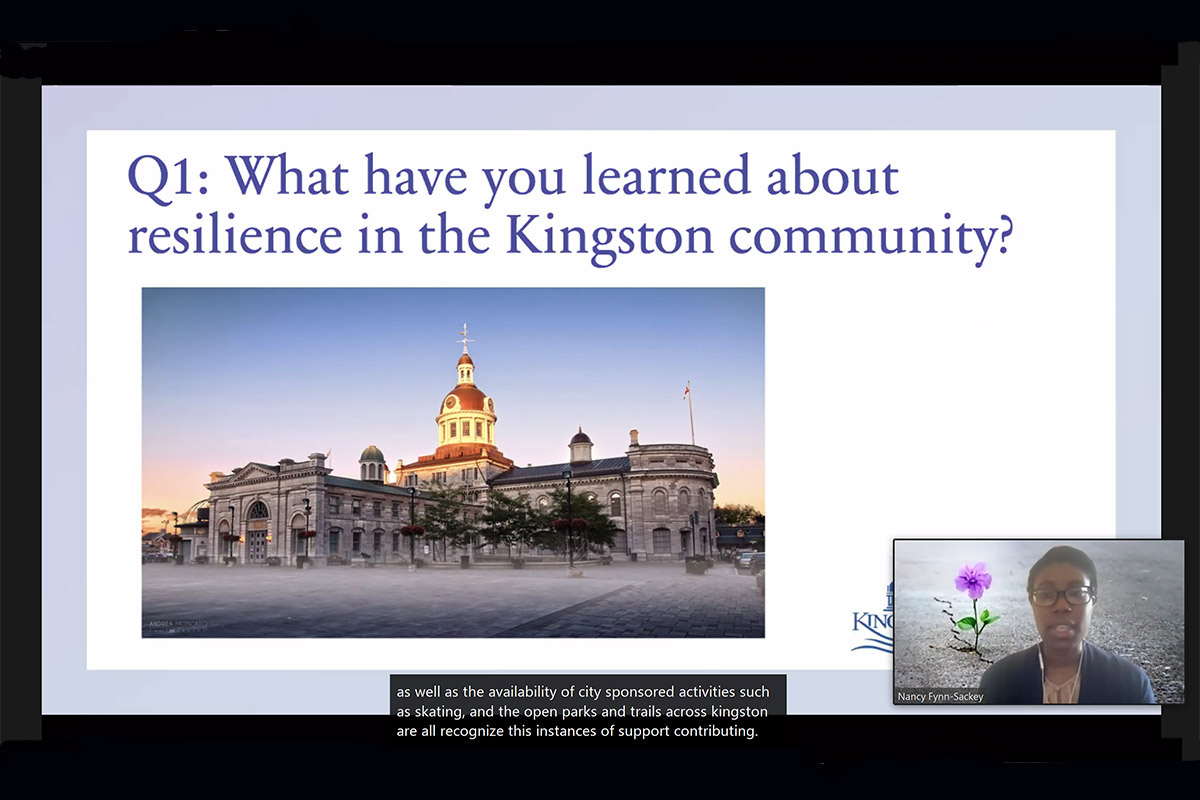Working together to support the community
April 20, 2021
Share

When Queen’s University and the City of Kingston work together, good things happen.
With both communities facing the new challenges caused by the COVID-19 pandemic, the annual PhD-Community Initiative pivoted to address key issues while at the same time fostering ties between Queen’s and the city with a focus on collaboration, community, and creativity.
Through the program, four teams of doctoral students worked with the City of Kingston on a series of projects related to the priorities of the Mayor’s Kingston Economic Recovery Team (KERT), while addressing the big question: How do we increase the community resilience that is required to support economic and social recovery post-COVID-19?
Participants came from across the university with a wide range of research areas and expertise and were formed into interdisciplinary teams.
“Our students have continuously demonstrated the talent, energy, and enthusiasm needed to fuel positive change by applying the skills and knowledge gained in graduate studies to addressing challenges beyond the academic arena,” says Fahim Quadir, Vice-Provost and Dean of the School of Graduate Studies. “At the same time they are giving back to the community in meaningful ways that will have long-lasting effects.”
Starting in September, the teams met on a weekly basis and have been supported by a mentor, most of whom are retired faculty members. Joined by Mayor Bryan Paterson, the program culminated on Monday, April 19 as each of the teams made their final presentations for their projects to a broad audience from within Queen’s and the wider Kingston community. The capstone event was hosted virtually and the presentations will be available online.
“The Queen’s PhD-Community Initiative has been an important annual opportunity for both students and community organizations to connect and create impact in our community,” says Mayor Bryan Paterson. “With the pandemic, the need is even greater for our community to come together to support each other, particularly those in social and economic distress. The four PhD teams collaborating with our Economic Recovery Working Groups have made significant contributions to advancing recovery and resilience in Kingston. I look forward to continuing to build strong relationships with graduate students at Queen’s.”
In fact, the Queen's PhD-Community Initiative's success bolstered Queen's successful submission to Times Higher Education's Impact Rankings, in which the university ranked 1st in Canada and 5th in the world for progress toward the United Nations' Sustainable Development Goals.
Supporting the community
For the participating doctoral students, the initiative not only provides an opportunity to support the community that is their home but also to learn new skills and apply the ones they have developed at Queen’s, while also making new connections within the university and city.
In addition to supporting the community, making valuable connections, and learning new skills, the students participating in the PhD-Community Initiative also complete several workshops designed to enhance their abilities and improve their project outcomes.
Some students have enjoyed their experience so much that they have participated in the program twice. Hannah Ascough, a PhD candidate in Global Development Studies, participated last year as a student and signed up again this year as a co-mentor, and learning new skills around leadership and managing teams.
“I initially involved myself in the program to connect and learn from students in other disciplines, and hear their perspectives on research, school and community engagement,” she says. “The PhD-Community Initiative certainly fostered these rich, lasting friendships; however, my experience was also rewarded by the connections our team made with our community partners. Through our project, I learned firsthand how creative interdisciplinary research is, and saw how it can be mobilized to make positive, long-lasting change. I have loved all my experiences with the initiative, and recommend it for anyone looking to engage with other graduate students, and give back to their community.”
For more information about the PhD-Community Initiative program, visit the Expanding Horizons website.
PROJECTS
PhD United (Resilient Kingston)
The aim of Resilient Kingston is to encourage and study resilience during the pandemic by offering members of the community a chance to connect with one another and share their experiences and perspectives in online focus groups. Participants discussed their perceptions of Kingston’s response to COVID-19, as well as topics related to making and maintaining social connections, adapting both personally and professionally, becoming more aware of privilege, and finding ways to safely engage with the community and its institutions during the pandemic.
TRIADS (Training and Reskilling Individuals through Actionable Deliverables that are Sustainable)
The TRIADS group’s goal is to empower the Kingston arts and creative community through upskilling opportunities post COVID-19. The group conducted a literature search and conducted interviews with local artists and faculty to determine the needs of the Kingston arts community. The recommendation for the city is an entrepreneurial program containing mentorship, continuous engagement, and experiential learning.
KOG (Kingston Outreach Group)
The pandemic is an excellent opportunity for PhD students to give back to the Kingston community. The KOG team focused on finding ways to better understand and support individuals who are working and yet still living in poverty.
C5 (Community COVID Concerns Communicated Consciously)
Through a survey completed by more than 2,000 people in the Kingston area, the C5 team investigated consumer habits and associated perceptions of risk during the pandemic and pre-pandemic. It is hoped that the findings will help Kingston businesses (and the city) to better understand the concerns of the community and provide responsive services and support.
A recording of the event will be available soon on the School of Graduate Studies’ YouTube page.